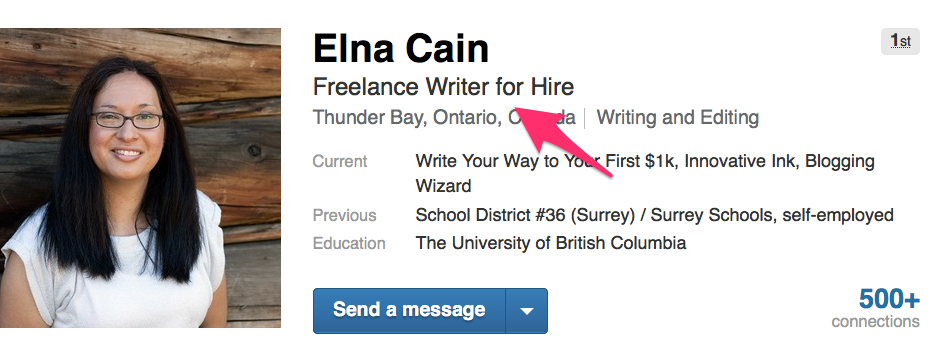With the emergence of remote workforce and online collaboration tools, freelance writing has become one of the most sought-after careers. It’s not surprising why. You are not confined to an office and can choose to work from anywhere, anytime.
However, there’s a flipside to this story. Did you know that there 53 million freelancers in US alone? With so many people competing for freelance gigs, how do you ensure a steady stream of work? The good news is that you can fix this problem with decent marketing.
Here are 5 advanced ways to market yourself as a freelance writer and get more clients
1. Position yourself not as a writer but as an expert
Consider this, your potential clients are not just looking for logical, structured & unique pieces of text but new ideas & insights in their area of business, that will help them become a thought leader.
For example, there are thousands of online stores, and most of them have an eCommerce blog that churns out 2-3 blog posts every week. When you write an article for your client, how do you make it stand apart? How do you compel people to share your article instead of those by your client’s competitors?
It’s essential to position yourself as an expert with in-depth knowledge and experience in your client’s field of business. Identify your strength and communicate it through your work (articles, blog posts, web copy). Don’t write about stuff that you’re not clear about.
2. House your portfolio at multiple places
A portfolio showcases your work as a writer and helps attract potential clients. It’s a collection of all the best articles, blog posts and other types of content you’ve created so far, as well as those in your niche.
You want to display your portfolio in as many places as possible, to maximize your exposure. Start by housing your portfolio on your website or blog. Also, add your portfolio to your LinkedIn profile.
Here’s an example:

Also, create an account on portfolio sites like Contently that allow you to create and share your portfolios. The nice thing about Contently is that you can easily upload your samples in a variety of formats (including PDFs) and track their social media shares. It also gives you insights about how engaging your articles are.
You can also house your portfolio on Pinterest. A lot of freelance writers are using Pinterest to promote their services.
Here’s an example:

Different clients hang out at different places online, so the key is to show your work at as many different places as possible to reach more people.
As you get more clients and do more work, ensure that you update each of these portfolios regularly.
3. Start a blog
Whether you’re a new freelance writer just starting out or a professional with years of experience, you must have your own blog to increase your visibility.
When you post content about your niche, it shows that you know stuff and allows you to position yourself as an expert (point #1). For example, if you’re looking for eCommerce clients, then start writing articles that help eCommerce store owners. You can begin by covering basic topics (e.g how to setup online stores) and eventually write about advanced topics (e.g 10 A/B testing tips for ecommerce sites). This way you’ll not only grab the attention of new online stores looking to produce basic level content, but also established eCommerce companies who are looking for experienced writers to create in-depth content.
4. Discover your niche
For many new freelance writers this is a challenge. Although you may start with a certain niche, there’s no law that stops you from exploring other industries.
The key is to find a niche that you’re not only passionate about but also that will help you make money. It’s really important to determine if you can continue to make a living writing about your niche.
For example, you might be interested in writing about natural health and parenting but quickly learn that it’s not easy to make a profit from writing about those industries. While you market yourself as a freelancer, you might find that digital marketing has a smaller but highly lucrative audience.
The first step is to explore various niches till you find a niche that you love writing about and that helps you get paid well. Once you get into the groove, build your portfolio in that niche.
This will not only help you build authority in your area of interest but also help spread the word. For example, writers like Neil Patel and Kristi Hines are well-known for their expertise in digital marketing. So companies looking for online marketing advice already know whom to approach, and reach out to them directly.
5. Advertise you’re for hire
This might seem like a no-brainer but many freelancers make simple mistakes and miss out on valuable opportunities.
For example, their author bio or LinkedIn profile simply states ‘freelance writer’. How will prospects know that you’re looking for an assignment?
Ensure that you explicitly mention that you’re ‘for hire’ in all your social media profiles. You’ll begin seeing more clients approach you within a couple of weeks.
Here’s an example:

Author bio is a hot piece of real estate that you should leverage to your maximum advantage. Every time you write for free, or publish a guest post on other blogs, your author bio will help you get noticed and attract more clients.
In your bio, ensure that you link to your website, blog or portfolio. The key is to lure a prospect to click the link to know more about you. Clearly mention what type of writing you undertake and what type of clients you work with (e.g I provide blog writing and copywriting for B2B and B2C companies). This will ensure that you get only highly-qualified leads.
Also, add links to your social media profiles, and as mentioned earlier, specifically point out that you’re for hire.
Here’s an example:

Wrapping up
If you’re interested in being a full-time writer or turning your freelancing into a career, then you need to spend some time marketing your services. It will only take a week or so to come up with an interesting author bio and setup your online profiles. Afterwards, it’s just a matter of updating it regularly. Being a freelance writer is more than knowing how to write. It’s also about being a smart marketer. You don’t need to be overly self-promotional. The key is to clearly communicate who you are and what you write about in an interesting manner, in as many different places as possible.




































